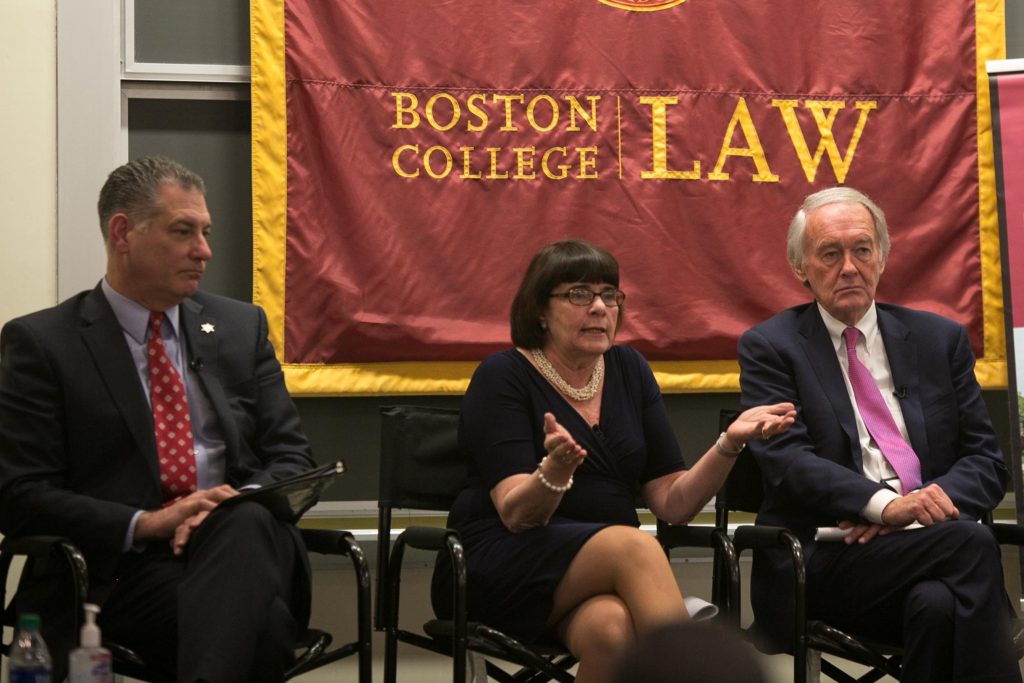Editor’s Note: Due to the novel coronavirus outbreak, Boston College has sent students home for the semester. Classes are being conducted remotely as is most school business. BC Law Magazine will continue to publish online, bringing you news and updates about the impact of the shutdown. In time, we will deploy our writers and tap our vast community to provide deeper perspectives and insights into the legal, economic, and political ramifications of the pandemic. We will also publish occasional stories, like this one, that step away from the disease to remind you of the more normal aspects of daily life within our community, past and present.
Our criminal justice system has become a trap that places individuals with mental illnesses and substance abuse problems in a vicious and perpetual cycle of punishment, according to an all-star panel of Massachusetts law enforcement officials and lawmakers participating in a Rappaport Center for Law and Public Policy program at Boston College Law School.
At the March 9 panel, US Senator Edward Markey ’72, Suffolk County District Attorney Rachael Rollins, Middlesex County District Attorney Marian Ryan ’79, Middlesex Sheriff Peter J. Koutoujian, and moderator Will Brownsberger, a Massachusetts state senator, stressed the need to end mass incarceration while emphasizing the importance of crime prevention and rehabilitation.
“We incarcerated two million, mostly African American men, in the 1990s,” Sen. Markey said. “We owe an apology to an entire generation of young African American men. The system failed them.”
DA Rollins said the criminal justice system—the “last catch basin at the end of several failing systems”—is not broken but rather has been working exactly how it was designed to work, resulting in unacceptably high recidivism rates.
“We have an incredibly high recidivism rate for some low-level crimes,” Rollins said. “If we were manufacturing cars, we’d be shut down immediately. If you have a 67 percent failure rate as a car manufacturer, you wouldn’t be able to make cars anymore.”
Koutoujian, newly elected as president of the Major County Sheriffs of America and the Massachusetts Sheriffs’ Association, said a one-size-fits-all approach to rehabilitation simply does not work.
“There are some dangerous people in these facilities that we want to protect society from and maybe help them get through their time there, too,” Sheriff Koutoujian said. “But a lot of our population has issues that can be corrected with the right type of support.”
Likewise, the panel agreed that crime prevention should begin early on with education and support programs for troubled children and young adults.
“We are a business that, unlike any other business, does not want repeat customers,” Ryan said. “The bulk of our work is figuring out how do we get in as early as possible and change people’s outlook, and help them with the things that very often lead them to the criminal justice system.”
The panel also discussed the militarization of the US Immigration and Customs Enforcement (ICE) agency, cash bail reform, and corrections-related Medicaid expansion, among other topics.
Speaking out against ICE arrests of illegal immigrants who show up at courthouses, the two district attorneys—who jointly sued the federal agency over the practice last April—argued that the federal policy not only hinders community policing efforts but also makes it harder for local prosecutors to achieve justice for victims of crime.
“DA Ryan and I will be doing the hard work of holding somebody accountable for a violent, serious crime—rape, armed assault, and murder—but if they are deportable, ICE takes them and deports them before we hold them accountable for that crime,” Rollins said.
Last June, a federal district court judge granted a preliminary injunction temporarily banning ICE from making civil arrests in state courthouses, and ICE’s appeal is pending in the First Circuit Court of Appeals.
More than 175 peopled attended the Rappaport panel, titled “Criminal Justice: Looking Ahead.”


